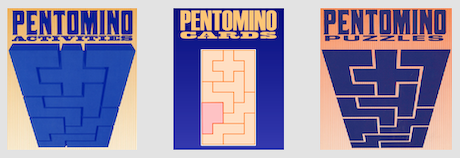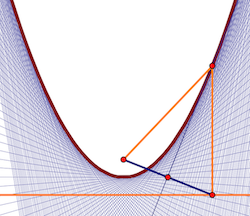New on my Blog and on MathEducation.page
Before my 32 years in high school math, I was a K-5 teacher and math specialist. That background informed much of my subsequent work in the classroom and as a curriculum developer. It is also the source of many of the ideas in this newsletter.
Seeing is Believing?
I welcome the increased availability of beautiful computer animations of math concepts. They are often elegant and satisfying — the contemporary manifestation of so-called "proofs without words", which are popular among mathematicians and math teachers. However these very animations can set a pedagogical trap: they are most effective with an audience that already understands their content. For beginners, they work best if they are preceded with some preliminary work, and followed by discussion or writing to supply the missing words. "There is no royal road to geometry", and there is no shortcut to understanding: students must engage intellectually, not watch passively. I discuss all this in a blog post.
Fraction Rectangles
Fractions, of course, are difficult. When teaching 4th and 5th grade in the 1970's I struggled with this, and came up with a powerful learning tool: fraction rectangles. The idea is that it is much easier to think about (say) `2/3` and `4/7` when looking at a 3 by 7 rectangle.

I discussed this in great detail on my website in 2013: Fraction Arithmetic on Grid Paper. Last year, I added explanatory videos to that page, as I'm told that these days "people expect that". Finally, a couple of weeks ago, I created Fraction Rectangles, a bare-bones GeoGebra applet as a support for this approach. (I used it to make the above figure.) I was tempted to make the applet more powerful and easier to use, but that would have undermined the basic pedagogical concept here: this approach is intended to empower the student, not highlight my GeoGebra prowess. So I decided to facilitate the drawing of the figures, and not go beyond that. Read more about this on my blog.
Pentomino Puzzle Books

Also in the 1970's, I had a weekly "math lab" in my class, during which students would solve assorted geometric puzzles, including many pentomino puzzles I created. In the 1980's, this led to my first publications: a series of books, starting with three pentomino puzzle books. Those remained in print for decades. They are now available as free downloads on my website. A new edition of a companion book (Pentomino Lessons) was published by Didax in 2013 under the title Working with Pentominoes. That book makes the curricular connections explicit, and works well as a complement to the three pentomino puzzle books. It includes teacher notes and solutions. It is also available as a PDF, which makes it easy to print, duplicate, or project pages.
Popular Pages?
- Every month, I get an email message from Google with an update on my site's "analytics", as they put it. One curious fact is that month after month after month, these two PDF's are among the "top performing pages", among the top three, in fact:
- From Factored to Standard Form (quadratic functions in Algebra 2)
- Skidding Distance (an application of the square root function)
- Hundreds of people visit those every month. How could that be? Surely those are not the best items on the site! Could it be a Google Analytics bug?
- In case you're curious, here are the other recent "top performers" according to Google:
- January: V-Shaped Graphs (good one, especially the first three questions)
- February: Henri Picciotto's Math Education Page (the site's front page)
- March: Virtual Pentominoes (big fun!)


